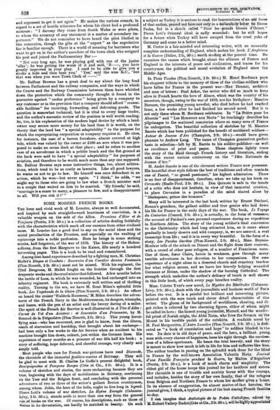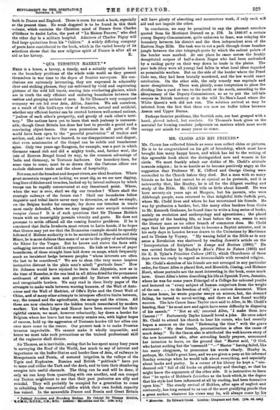SOME MODERN FRENCH BOOKS.
Ties keen and vivid work of M. Lenotre, always so well documented, and inspired by such straightforward heartiness of conviction, is a valuable weapon on the side of the Allies. Prussiens d'Hier et de Toujoure (Perrin, 3 fr. 50 c.) is a collection of articles dealing faithfully with the characteristics which mark off our enemies from other civilized races. M. Lenotre has a good deal to say on the social ideas and the moral peculiarities of the Prussian, and especially on the exalting of espionnage into a noble profession. Here he brings in some striking stories, half forgotten, of the war of 1870. The history of the Hohen- zollertut, .from the first Margrave to the Kaiser, fills nearly a hundred interesting pages. This is a book to be read and remembered.
Among first-hand experiences described by a fighting man, M. Christian Mallet's Mapes et Combats : Souvenirs d'un Cavalier devenu Fantassin (Plon-Nourrit, 3 fr. 50 c.) must not be missed. With his regiment, the 22nd Dragoons, M. Mallet fought on the frontier through the first desperate weeks and the cruel winter that followed. A few months before the battle of Loos, in whioh he was wounded, he had exchanged into an infantry regiment. His book is extremely well written and of thrilling reality. Turning to the sea, we have M. Rene Milan's splendid little book, Les Vagabonds de la Gloire (Plon-Nourrit, 3 fr. 50 c.). An officer on board the cruiser `Waldeck-Rousseau,' hi. Milan describes the adven- tures of the French Navy in the Mediterranean, its dangers, triumphs, and losses, with the pen of an artist and the breezy daring of a sailor. The spirit of the French Air Service is well illustrated in A Tire d'Ailes : Carnet de Vol d'un Aviateur : et Souvenirs d'un Prieonnier, by M. Renaud de la Fregeoliere (Plon-Nourrit, 3 fr. 50 c.). This young heroic flying man—who has recovered, one is glad to know, from the illness, result of starvation and hardship, that brought about his exchange— had boon only a few weeks in the Air Service when an accident to his machine brought him down, unhurt, just within the German lines. His experience of many months as a prisoner of war fills half his book ; a story of suffering, hope deferred, and cheerful courage, very clearly and simply told.
Most people who care for French war-pictures have read Dixmude, the chronicle of the immortal ipsiliers-marina of Brittany. They will be glad to meet with M. Charles Le Goffic's present delightful book, Bourguignottes et Pompons Rouges (Gres et Cie., 3 fr. 50 c.). It is a volume of sketches and stories, the more enchanting because they are true, beginning with tho days of mobilization in Brittany, continuing on the Ysor and the Belgian front, and concluding with the personal adventures of two or three of the writer's gallant Breton countrymen, among. whom Jobic, the hero of the bells, ought to live long in legend. Pierre Loti's volume of war sketches, La Hylne Enragie (Calmann- Levy, 3 fr. 50 c.), stands aside in more than one way from the general run of books on the war. Of course, his descriptions, such as those of Reams in its devastation, can hardly be matched in beauty. On such
a subject as Turkey it is curious to read the lamentations of an old lover of that nation, poured out hero not only in a melancholy letter to- Enver Pasha, but in a sketch called " Pour lee - grands blesses d'Orient." Pierre Loti's Oriental ideal is sadly wounded : but he still hopes for a future when Turkey will have escaped from the cruel yoke of Germany and came to & better mind.
M. Centre is a fair-minded and interesting writer, with an unusually complete understanding of England, which makes his ,book L'Angleterre et in Guerre (Didier, 3 fr, 50 c.) worth reading at the present time. He examines the causes which brought about the alliance of France and England in the interests of peace and civilization, and traces for his countrymen the political and- moral evolution of England since the Ages.
In Trois Tombea (Plon-Nourrit, 3 fr. 50 c.) M. /Iona Bordeaux pave his eloquent tribute to the memory of three of the civilian-soldiers who have fallen for France in the present war—Max Doumic, architect and man of letters : Paul Acker, the writer who did so much to keep alive in French hearts the love of Alsace, which was the country of his ancestors, though, owing to the war of 1870, not his birthplace : Maurice Demure, the promising young novelist, who died before he had reached
fame, a few weeks after he had finished his second- novel. But it is not only these whom M. Bordeaux celebrates In ""La Pribre pour lee Absents " and " Les Honneurs aux Morts " he touchingly describes his pilgrimages to the scattered cemeteries where so many sons of France lie unforgotten. The beautiful collection of sketches- by IL Maurice Banes which has been published for the benefit of mutilate& soldiera- Aulour de Jeanne d'Arc (Champion, 3 fr. 50 c.)—would have given pleasure to Andrew. Lang. The name of Champion guarantees perfect taste in selection—left by M. Banes to his soldier-publisher—as well, as excellence of print and 'paper. These chaptent lightly trace the story of the Maid through French "history and literature, ending with the recent curious controversy on the "Fete Nationale de Jeanne d'Arc."
M. Andre Snares is one of the cleverest writers France now possesses. His beautiful clear style follows the best of traditions and often reminds one of Pascal, " co grand passionne," his highest admiration. There is no fear of disappointment, therefore, when we take up his book on Cervantis (Emile-Paul, 3 fr. 50 c.). Don Quixote is safe in the hands of a critic who does not hesitate, in view of that immortal creation, to place Cervantes in a paradise of the mind shared alone by " Shakspeare, prince des hommes."
Many will be interested in the last book written by Ernest Psichari, Renan's grandson, the gallant soldier and true genius who laid down his life for France in the early days of the war. The book, Le Voyage du Centurion (Cunard, 3 fr. 50 e.), is actually, in the form of romance, the account of Psichari's own personal experiences during an expedition in Northern Africa. The story of the young soldier's final conversion to the Christianity which had long attracted him, as it came about gradually in lonely deserts and wild company, is, wo are assured, a real transcript from life ; and it is in every way beautiful. In the form of a story, Lee Paroles &writes (Pion-Nourrit, 3 fr. 50 c.), Mine. Reynes- Monlaur tells of the attack on Dinant and the flight- from their convent, with a crowd of other poor refugees, of a number of Franciscan nuns. One of these, Sceur Claire, heroic in weakness, goes through many- terrible adventures in her devotion to her companions. Her own experience of a night alone in a deserted church and cemetery teaches her what religion means, and we leave her bravely helping wounded Germans at Reims, under the shadow of the burning Cathedral. The strength which underlies the author's delicacy of touch is well shown in this little book, of which every page breathes reality.
Mme. Colette Yver's new novel, Le Mystire des Bfatitudes (Calmann- Levy, 3 fr. 50-c.), deals with the journalistic and business world of Paris before the war. It is a painful but brilliant and interesting picture, painted with the sure touch and clever detail characteristic of this writer. The gloom of its background of worldliness, cheating, and in- got riches is relieved by two charming, figures, either of whom might be called its hero : the honest young journalist, Muzard, and the wonder- ful priest of Jewish origin, the Abbe Nairn, who lives the Sermon on "the Mount in his terrible parish of the outskirts. A readable novel by 11. Paul Margueritte, L'Autre Lumidre (Plop-Nourrit, 3 fr. 50 c.), is dedi- cated as " a book of consolation and hope" to soldiers blinded in the war. Its date is in old days of peace, and the hero, a brilliant young man with every chance of happiness, loses his sight through the careless- ness of a fellow-sportsman. He bears the trial bravely, and the story is meant to show how much is left in life for him and sufferers like him-. The author touches in passing on the splendid work done for the blind in France by the well-lmown Association Valentin Flatly. Journal dune Famille Francaise pendant In Guerre, by Mitten d'Arguibert (Perrin, 3 fr. 50 c.), is a book of much charm and simplicity. The eldest girl of the house keeps this journal for her brothers and sisters: Her chronicle is one of trouble and anxiety borne with fine courage, and includes, besides the story of her own family, that of the refugees from Belgium and Northern France to whom her mother gives a home. In its absence of exaggeration, its almost matter-of-faot heroism, the journal gives, I think, a typical picture of the best among French families to-day.
I can imagine that Anthologie de /a Pofaie Catholique, edited by U. Robert Vallery-Radot (Orbs et Cie., 3 fr. 50 c.), will be highly appreciated both in France and England. There is roam for such a book, especially at the present time. No weak doggerel is to be found in this thick volume, which contains the Christian mind of France from Charles d'OrkSans to Andre Lafon, the poet of " La Maison Panvre," who died the other day In a military hospital. Admirers of Charles Peguy will find large quotations from his " Cahiers." A widely differing company of poets have contributed to the book, which in the varied beauty of its selections shows that the new religious spirit of France is after all as















































 Previous page
Previous page